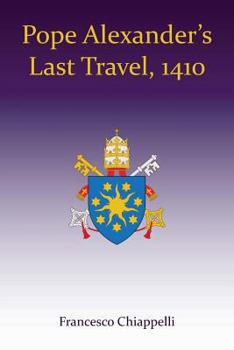Pope Alexander's Last Travel, 1410
Written as a historical narrative, Pope Alexander's Last Travel relates the story of an individual, who happens to be Pope Alexander V, as he is forced into a perilous crossing of snow-capped mountains with his papal Court in early Spring 1410. It focuses on the human story of the man, as it might have been, constructed about the historical facts that are known to all and well established in scholarly documents and original records.
Pope Alexander V lived at a time of great turmoil within the Church and the world: the challenges of the Western Schism, the separation between the Eastern and Western Church, and the threat posed by the Ottoman Turks. Francesco Chiappelli's narrative explores these themes and provokes the question, "What might have been had Pope Alexander V's papacy lasted longer?"
This is the story of Pope Alexander's last travel through the hills of the Appennines in the Spring of 1410 as he made his way towards Rome.
About the Author
A secular Franciscan within the Roman Catholic Church, much of Francesco Chiappelli's works reflect Franciscan spirituality. He is also a scientist and emeritus professor at UCLA, having worked in the Center for Health Sciences and published over 200 peer-reviewed scientific papers, in addition to chapters and books on topics as wide-ranging as biostatistics to molecular virology. He is also a Fellow of the American Association for the Advancement of Science, one of the few overseas Fellows of the Royal Society of Medicine and a Fulbright alumnus. He values science as the pursuit of our abilities to think and to reason, but believes that this ability is always secondary to our grace of faith; a person can be a good and sound scientist while remaining true and committed to putting Christ at the center of it all. He views our role as humble instruments to the greater glory of God through, in and with Christ - as majoram Dei gloriam - and thus, while having been a scientist all of his life, he has always tried to follow Christ's teaching in Franciscan humility.





